
The Palace of Justice, seat of the Supreme Court of Cassation in Rome. (Fred Romero/Flickr, CC BY 2.0)
Italian veterans may be winning compensation for their wartime exposure, but Phil Miller reports the British army insists it is safe to supply Ukraine with the toxic tank shells.
By Phil Miller
Declassified UK
 More than 300 Italian veterans who developed cancer after being exposed to depleted uranium ammunition have won court cases against Italy’s military. Some of the cases were brought by their bereaved relatives.
More than 300 Italian veterans who developed cancer after being exposed to depleted uranium ammunition have won court cases against Italy’s military. Some of the cases were brought by their bereaved relatives.
The judgments have mounted in recent years, with Italian courts repeatedly finding a link between cancer and service in the Balkans where such weapons were fired.
Although Italy does not have depleted uranium weapons in its own arsenal, Italian police and soldiers were deployed to Bosnia and Kosovo where NATO allies fired the controversial ammunition in the 1990s.
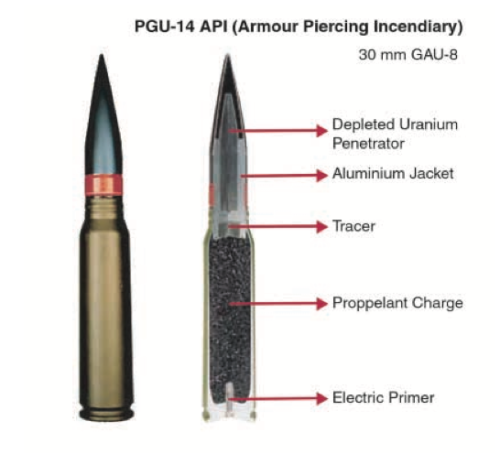
Diagram of DU ammunition. (UNEP 2001 report “Depleted Uranium in Kosovo, Post-Conflict Environmental Assessment)
Depleted uranium (DU) is a chemically toxic and radioactive heavy metal produced as waste from nuclear power plants. Britain uses it to make armour-piercing tank shells, which are now being supplied to Ukraine.
Scientific debate continues about DU’s long-term risks to human health and the environment in post-conflict zones. British ministers insist it is low risk, and that there is only “some potential heavy metal contamination localised around the impact zone.”
But in the Balkans and Iraq, many believe it has caused cancer. That view was shared in 2009 by a coroner in England, who held an inquest into the death of Stuart Dyson, a British army veteran.
Dyson cleaned tanks during the Gulf war in 1991 and later developed a rare cancer, passing away in 2008. An inquest jury found it was “more likely than not” that depleted uranium had caused his death.
The Ministry of Defence rejected the ruling and refused to pay his widow a pension for those who die from service. By contrast, the widow of Captain Henri Friconneau, a French gendarme who served in Kosovo, was granted a service pension when he later died from cancer.
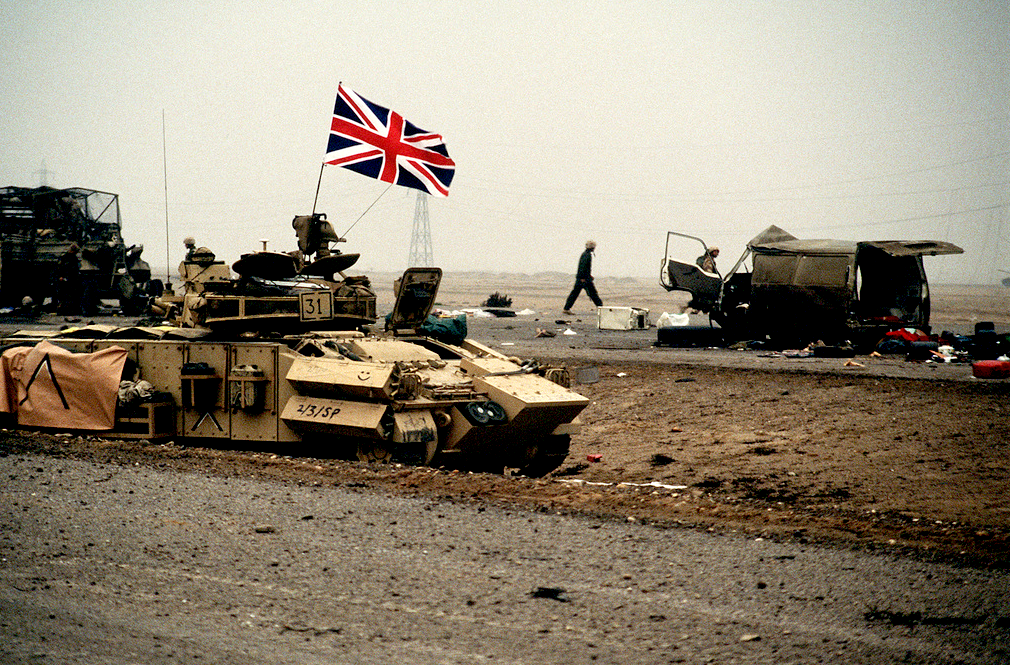
Feb. 28, 1991: A British tank on the Basrah-Kuwait Highway near Kuwait City during the Gulf War. (U.S. National Archives/Public domain)
[Related: Using Poison in Ukraine’s Depleted Hope of Victory]
An appeal court in Rennes ruled in 2019 that Friconneau’s death was due to his exposure to DU dust. France’s Interior Ministry accepted the judgment and added his name to a monument for those who died on operations in Kosovo.
When in Rome
But it is in Italy where the highest number of veterans have won compensation. One family received a 1.3 million euros pay out in 2015 after the court of appeal in Rome found “with unequivocal certainty” a link between exposure to depleted uranium dust and cancer.
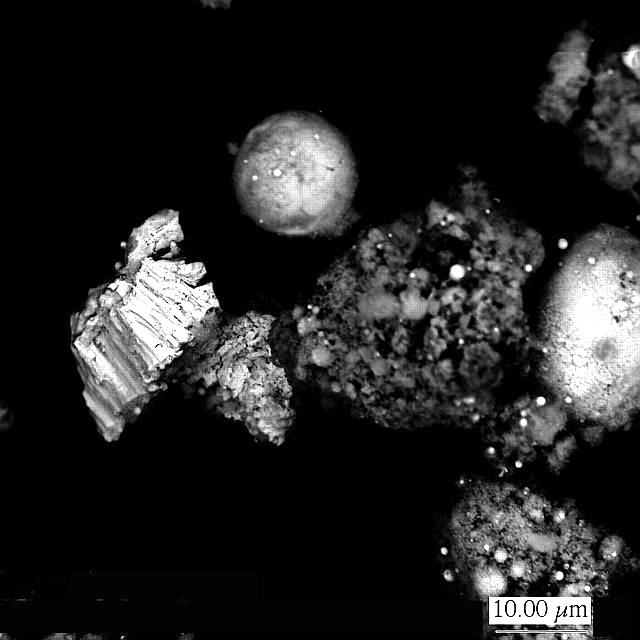
Magnified image of depleted uranium aerosol particles generated from the impact of a DU projectile with conventional armor. (Pacific Northwest National Laboratory/Flickr, CC BY-NC-SA 2.0)
The Il Fatto newspaper said the judgement went further than previous rulings, as it recognised a causal link beyond just the balance of probabilities.
A more recent ruling in 2018 seen by Declassified found the court could not “rule out the possibility that a soldier who served” in the Balkans “would have been exposed to genotoxic pollutants, thus increasing the likelihood of illness.”
An Italian parliamentary commission into the issue found “shocking” levels of exposure among Italian veterans and said it had “helped sow deaths and illnesses.”
Last month, Euronews reported that 400 Italian soldiers who were exposed to DU in the Balkans had since died from cancer, and another 8,000 were suffering from the disease. They interviewed the lawyer at the centre of the litigation, Angelo Tartaglia, who urged Britain to “think about the risks and the consequences” of supplying Ukraine with DU shells.
Tartaglia said: “There’s the possibility that both Ukrainian and Russian military officials might fall ill but most importantly pollution caused by military activities could cause irreversible damage to the environment which means that civilians too would be at risk.”
‘Panic in Italy’
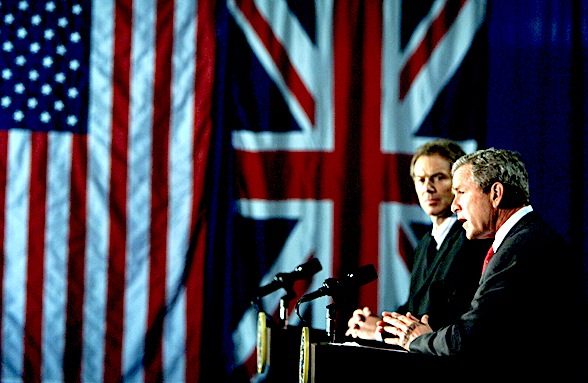
Feb. 5, 2002: U.S.President George W. Bush, right, and U.K. Prime Minister Tony Blair in joint news conference at Bush’s ranch in Crawford, Texas. (The U.S. National Archives)
Depleted uranium has been a controversial topic in Italy ever since soldiers returned from Kosovo. It was discussed in 2001 by fromer Prime Minister Tony Blair’s cabinet, which felt “the panic in Italy…[was] premature since there had been no time for cancers to have developed.”
Although Blair wanted to “appear sympathetic,” he was also anxious not to jeopardise the U.K.-U.S. special relationship as George W. Bush entered the White House.
Blair’s cabinet decided: “The government should handle this in a low key manner and avoid the impression that it was distancing itself from the United States of America — which was the country that had used depleted uranium in Kosovo — just at the moment when a new US administration was coming to power.”
The invasion of Iraq in 2003 saw British and U.S. forces firing the ammunition, triggering widespread concern. Britain’s Ministry of Defence recognised a “moral obligation” to help Iraq clean up the shells after the war and published the firing locations.
The same approach is not being followed in Ukraine, where Britain has supplied thousands of tank shells, including some made from DU.
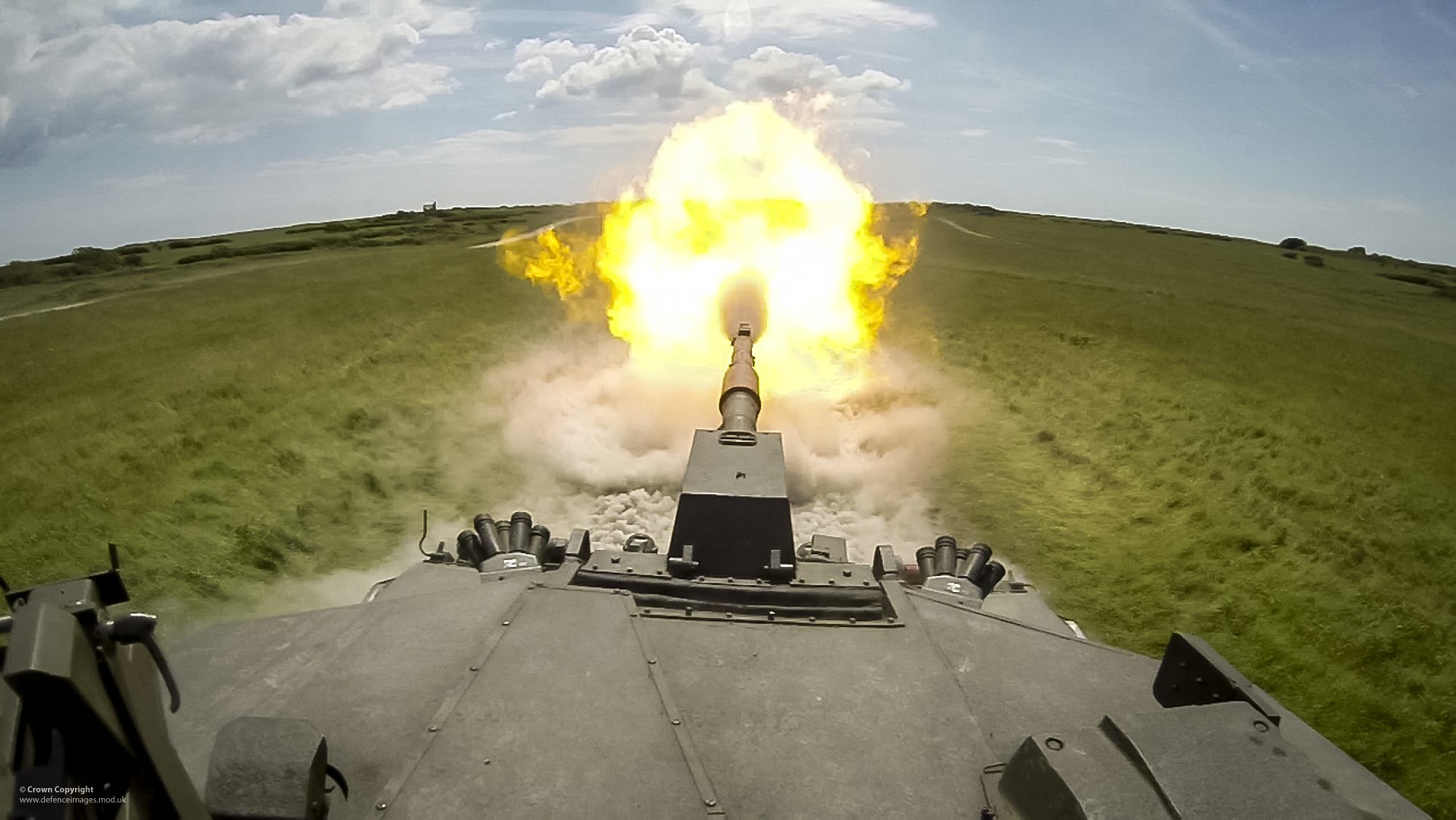
A Challenger 2 tank firing a practice round on Castlemartin Ranges in Pembrokeshire, Wales, 2014. (Defence Imagery/Flickr, CC BY-NC 2.0)
Armed forces minister James Heappey has told Parliament: “British-supplied Challenger 2 tanks and depleted uranium ammunition granted to Ukraine are now under the control of the Armed Forces of Ukraine (AFU). The Ministry of Defence does not monitor the locations from where DU rounds are fired by the AFU in Ukraine.”
He added: “There is no obligation on the U.K. to help clear up depleted uranium rounds fired from Challenger 2 tanks by the Armed Forces of Ukraine.”
This article is from Declassified UK.
Phil Miller is Declassified UK’s chief reporter. He is the author of Keenie Meenie: The British Mercenaries Who Got Away With War Crimes. Follow him on Twitter at @pmillerinfo

Here is the US Department of Energy Material Safety Data Sheet for Uranium.
Since the only difference between Uranium and Depleted Uranium is a reduced proportion of radioactive U235, it should be equally applicable to DU
hxxps://www.energy.gov/sites/prod/files/2020/11/f80/SDS-Uranium_Metal_2020.pdf
It is classified as a toxin, i.e. a poison, and is required to be marked with the skull and crossbones in red diamond poison warning sign.
See
Section 2: HAZARDS IDENTIFICATION
and
Section 11: TOXICOLOGY INFORMATION
“Depleted uranium (DU) is a chemically toxic and radioactive heavy metal…”
Toxin and poison are synonyms. Chemically toxic therefore means poisonous. The quote can be re-written with identical meaning as:
Depleted uranium (DU) is a poisonous and radioactive heavy metal…
Use of poisonous weapons has been outlawed for over 100 years:
1907 Hague Convention IV CONVENTION RESPECTING THE LAWS AND CUSTOMS OF WAR ON LAND
SECTION II HOSTILITIES CHAPTER I Means of Injuring the Enemy, Sieges, and bombardments
Art. 23.
In addition to the prohibitions provided by special Conventions, it is especially forbidden –
To employ poison or poisoned weapons;
Wow, it seems that no matter the nation—it seems that the lives of soldiers do not really matter to the military of so many nations.
If life was a movie, then each warring nation would have one defender. The Olympics of Life—–and whoever was left standing was the winning nation. And no nation had the right to have a war until a decade had passed.
Of course those who specialize in murderous effects would be disappointed—- but that is the only thing I can think of where a little bit of sanity serves the world so much better than any kind of war.
It’s incredible they use such poisons in a country defined the “barn” of Europe.
I don’t know if the “west” is politically lead by idiots, or if they want not only the economic, but also the physical destruction of Europe!… also because ucranian grain remained in Europe and not in Africa as supposed.
The name depleted uranium might lead some to think it contains no U235, which is not the case:
“It typically contains 30-40 per cent of the concentration of U-235 found in natural uranium, or about 0.2 to 0.3 per cent by weight.”
hxxps://ec.europa.eu/health/scientific_committees/opinions_layman/depleted-uranium/en/l-2/4.htm
A really large “Thank You” Ian Perkins, I’m hoping very much he read my reply to his comment left for an earlier piece.
@hXXps://www.iaea.org/topics/spent-fuel-management/depleted-uranium
Now we desperately need clarification of why the information from his site differs so greatly from the site I have again listed above.
Note: didn’t list this site in the prop from search. but upon retrieving the address from my history I did get it up again.
I intend to contact the Bulletin of Atomic Scientists @ hXXps://thebulletin.org
Thanks again Ian, Thanks CN
Thank you for writing this this Phil. We posted this 4-part series fifteen years ago. At one time it was reposted on a hundred sites worldwide. We thought we’d stuck a dagger in the monster’s throat, but the Ukraine horror story is bringing it back to life! (Along with other monsters.) (info@notinkansas.us)
hxxps://www.notinkansas.us/du_1.html
How is the use of depleted uranium even justified? If the intent is NOT to make the enemy (and many of your own soldiers, collaterally damaged) get sick and die, then why is it even there? I don’t understand.
Unfortunately, from what I know, depleted uranium has the feature of being able to penetrate tanks, so one can argue that the intention is not to produce the collateral damage, but to combat the tanks. The argument against deleted uranium is that, like land mines, it has the feature of causing suffering and death to totally innocent victims long after whatever war is involved has run its course. We are living in crazy times.
Tungsten can also be used.
‘ The world’s biggest maker of tungsten-based armaments is Rheinmetall AG of Ratingen, Germany. The company’s defense subsidiary, Rheinmetall DeTec, is the leading supplier of antitank munitions for the armies of Germany, Italy and Spain, among others. Although the company once tested DU with the German government in the 1970s, it produces no arms with the substance. “Tungsten does the job just as well as depleted uranium,” says spokesman Oliver Hoffman. ‘
hxxps://www.wsj.com/articles/SB980811454568652778
These weapons are an abomination. Just like the bombs dropped on Hiroshima and Nagasaki.
And just like the politicians and people who control their use!
The toxicity IMO of Nuclear Waste employed as ammo… Is Far LESS Important than perception by Moscow strategists this question:
Is NATO FIRST to DEPLOY………….. Nuclear Weaponry?
Add Chernobyl Disaster to mix… First hand national experience may have Previously included ameliorating info to above decision… (Unk)
It’s not clear what you are saying. Are you trying to implicate the Russians via Chernobyl? That was not an act of war.